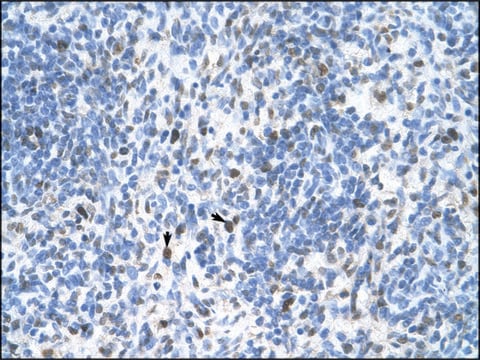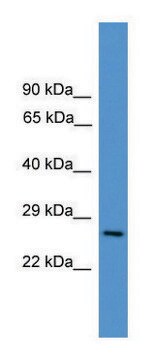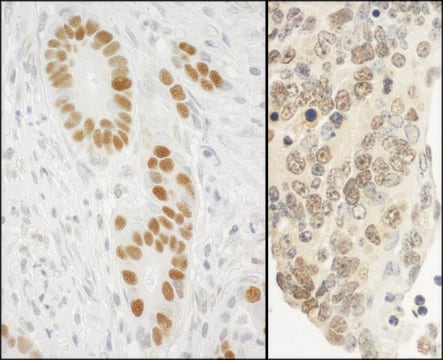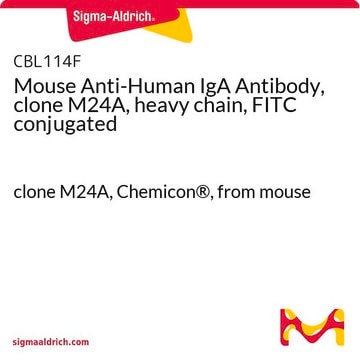일반 설명
Anti-Proliferating Cell Nuclear Antigen antibody (mouse IgG2a isotype) is derived from the PC 10 hybridoma produced by the fusion of mouse myeloma cells and splenocytes from a BALB/c mouse. PCNA is an auxiliary protein of DNA polymerase δ and belongs to the conserved sliding clamp family of proteins.
PCNA (proliferating cell nuclear antigen) gene is mapped in human chromosome 20p12.3. PCNA is a homotrimeric protein, which is expressed in the nucleus. The PCNA ring has a large central cavity that allows double-stranded DNA to slide freely along it.
특이성
Monoclonal Anti-Proliferating Cell Nuclear Antigen (PCNA) specifically recognizes Proliferating Cell Nuclear Antigen from human, monkey, rat, mouse, insect and yeast origin.
면역원
PCNA-Protein A fusion protein.
애플리케이션
Anti-Proliferating Cell Nuclear Antigen antibody, Mouse monoclonal may be used in:
- enzyme-linked immunosorbent assay (ELISA)
- immunoblotting
- flow cytometry
- immunohistochemistry
- immunoprecipitation
- immunofluorescence
생화학적/생리학적 작용
PCNA (proliferating cell nuclear antigen) maintains the polymerase and DNA association by forming a sliding clamp and ensures efficient DNA replication. PCNA is responsible for recruiting important regulatory factors for DNA damage tolerance mechanism. In response to UV irradiation-induced DNA damage, monoubiquitination of PCNA mediates the polymerase switching model by recruiting DNA polymerase η to PCNA. The protein is involved in base excision repair and maintains genome stability. PCNA is associated with proteolysis coupled to DNA synthesis and repair for proper cell cycle progression.
PCNA protein is essential for chromosomal DNA replication during S-phase and is required for several DNA processes like DNA repair, sister chromatid cohesion and cell cycle control. This protein is also involved in the epigenetic modification and chromatin assembly and remodeling. PCNA acts as a prognostic and diagnostic marker in several diseases such as breast cancer, chronic lymphoid leukemia, non-Hodgkin′s lymphoma, malignant and nonmalignant skin diseases and systemic lupus erythematosus.
물리적 형태
Solution in 0.01 M phosphate buffered saline, pH 7.4, containing 15 mM sodium azide.
저장 및 안정성
For continuous use, store at 2-8°C for up to one month. For extended storage, freeze in working aliquots. Repeated freezing and thawing is not recommended. If slight turbidity occurs upon prolonged storage, clarify the solution by centrifugation before use. Working dilution samples should be discarded if not used within 12 hours.
면책조항
Unless otherwise stated in our catalog or other company documentation accompanying the product(s), our products are intended for research use only and are not to be used for any other purpose, which includes but is not limited to, unauthorized commercial uses, in vitro diagnostic uses, ex vivo or in vivo therapeutic uses or any type of consumption or application to humans or animals.









